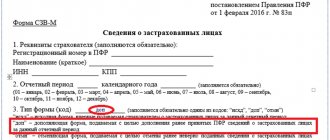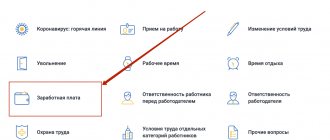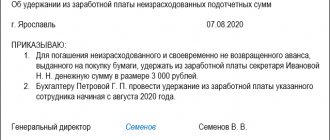Who is called to the commission
Features of the selection of subjects are set out in the letter of the Federal Tax Service dated July 17, 2013 N AS-4-2/12722. It states that the choice is made on the basis of the economic activity of the organization, the specifics of taxation during reorganization, liquidation, and bankruptcy. A company is selected for a commission call based on the following criteria:
- Information set forth by the taxpayer in a statement of loss. Suspicion may be raised by the indication of a negative loss for the last 3 years or the lack of information about losses.
- Reduced taxation for individual entrepreneurs for excise taxes, simplified taxation system, personal income tax. You need to divide the tax amount by the amount of all income of the enterprise. If the result is a number less than 3, the load is considered light. For trade entities this number will be less than 1.
- Reduced tax burden for VAT. To determine the low load, you need to divide the VAT to be reimbursed by a similar indicator to be paid. If the calculation result is more than 89%, this indicates a reduced indicator.
- Arrears on personal income tax. To detect arrears, information from 2-NDFL certificates is compared with actual payments. RSV-1 PFR can also be used to obtain information.
- Companies that paid personal income tax less by 10% compared to the previous tax period. This item is identified on the basis of payment cards, the dynamics of received payments, the number of company employees (according to data submitted to the Pension Fund), and the amount of payments by branches.
- Low salaries for employees relative to sector salaries. The information is analyzed based on the 2-NDFL certificate, all company payments to its employees, the average number of employees. A candidate for consideration by the commission is an organization that pays wages less than the minimum wage.
- Application for a professional deduction equal to more than 95% of the enterprise's income. This paragraph applies to individual entrepreneurs. 3-NDFL declarations are checked. In the process, line 120 indicators are divided by 110 indicators.
- Individual entrepreneurs who recorded a certain amount of revenue in the VAT return, but entered 0 in the 3-NDFL declaration or did not fill out the form in question at all. Inconsistency between information from two documents may raise suspicions.
What happens if employee salaries are below the industry average ?
Question: Can the tax authority, as part of the work of the commission on legalization of the tax base, require the submission of employment contracts? View answer
Let's consider additional criteria:
- Receipt of data on the income of residents of the Russian Federation from foreign countries.
- Receipt of data on concealment of income from the Department of Internal Affairs, the prosecutor's office, individuals and legal entities.
- Application of tax breaks and reduced rates without proper justification.
- Providing VAT refund.
- Various violations of the law in the field of tax law.
After compiling a list of companies subject to control, the order of invitation to the commission is determined. First in line are companies with a larger amount of taxes to potentially be refunded. Once the priority is determined, notifications are sent to companies. They contain recommendations for eliminating the offense. If a legal entity or individual entrepreneur has not followed the recommendations, a letter is sent calling the commission.
Normative base
Many subjects, having received a notification, decide not to attend the meeting of the commission on the legalization of taxable objects. This reaction is quite understandable: in the Tax Code, as mentioned above, there are no rules providing for such a procedure. Let's turn to the legislation.
According to the provisions of Article 31 of the Tax Code, control authorities are authorized to summon tax subjects with written notice to give explanations on issues related to the payment (withholding, transfer) of amounts to the budget, conducting a tax audit, and in other cases related to the execution of Tax Code regulations.
It is these “other cases” that the commission on the legalization of taxable objects refers to.
Experts do not recommend avoiding appearing, recalling that one of the criteria for planning an on-site inspection is the subject’s failure to provide explanations when receiving a corresponding request from the Federal Tax Service. Consequently, it will not be possible to avoid the negative consequences of avoiding appearing at a meeting.
Main features of commissions
Control of a company by a commission is a pre-trial method of resolving tax disputes. The event can also be called a pre-verification action. Let's consider the goals of the commission:
- Improved tax revenues.
- Increase in the collection of income tax, as well as insurance premiums.
- Identification of incorrect data in accounting and tax reporting.
- Detecting the issuance of unofficial salaries to employees.
- Prevention of late transfer of income tax and insurance contributions.
- Identification of companies paying wages below the minimum wage.
- Identification of organizations that do not officially employ employees in order to reduce the tax base.
FOR YOUR INFORMATION! It is assumed that the work of the commission encourages companies to independently clarify the exact amount of taxes and contributions due for payment and to avoid violations of tax law.
Some examples of explanations
At the commission for the legalization of taxable objects, the subject can provide the following explanations on issues related to the occurrence of losses:
- The person has just started a business. It is advisable to provide such justification if losses arise from the beginning of the entity’s operation, and costs are higher than income.
- Modernization/repair of assets is being carried out, an aggressive policy of capturing the market sector is being carried out, expansion is planned, and new areas of business are being developed. These reasons justify situations where the rate of increase in costs is higher than the rate of growth in income.
- A decrease in sales due to changes in market conditions or an expected increase in the cost of goods sold. This explanation can be given if costs remain the same and profits decrease.
According to subjects who attended such commissions, inspectors want to hear only one thing: the entrepreneur will begin to contribute large sums to the budget in the very near future. However, according to lawyers, such a promise should not be made. The fact is that often inspectors offer to agree on upcoming indicators, “meeting” the subject.
Features of the conduct and organization of the commission
Each company is considered by the commission individually. After the control event, the following documents are drawn up:
- The minutes of the meeting, which must be signed by the secretary, as well as the chairman of the commission. The taxpayer's representative gets acquainted with the protocol against signature. A person may request a copy of the protocol.
- Recommendations that reflect the actual amount of taxes, the amount of additional payment, etc. The period for eliminating violations is 10 days.
The company is obliged to comply with all instructions of the commission. The fact that violations have been eliminated is verified by the Federal Tax Service inspectorate. If the company has not taken any action, a decision is made to conduct an on-site inspection.
What a director can do and what are the consequences of various actions
The inspection, as a rule, does not order a pre-inspection analysis until it has spoken with the director of the company. Therefore, her goal is to get a manager to talk at the commission. Does this mean that there is no need to come under any circumstances? The “don’t come” option exists, but not everything is so simple.
Not to come.
Good reasons:
- one of the company’s employees was diagnosed with COVID, so the director is now also at risk;
- the manager had contact with a COVID patient and therefore self-isolated;
- The director has signs of COVID: no sense of smell, so it is better for him to stop all contacts and self-isolate.
What could be the consequences?
Either they will continue to call you, but then they will leave you behind, or they will transfer the materials on you for pre-inspection analysis, and then it will not be long before you are included in the on-site inspection plan.
Go.
There is no point in going alone; you need to go with a lawyer. Why is there no point in going alone? Because the lawyer:
- will evaluate the seriousness of the inspectorate’s arguments;
- will find out who is the initiator of calling the director to the commission: the territorial inspection (IFTS) or the department (UFTS);
- predict what will happen next;
- will offer options for action.
It is better if the initiator of the director’s call is the Federal Tax Service, because if you do not come when called, then there is some probability that they will simply forget about you. And if the territorial tax office has received instructions to call you to a commission from the Department, then the Federal Tax Service will not be able to “score” you, because you will need to report to the Department.
The situation requires assessment. The worst thing that can happen is the appointment of a VNP. Its consequences are quite predictable - business ruin, bringing the director to criminal and vicarious liability.
How to behave at the legalization commission
The peculiarities of behavior at the commission are determined by what questions the representatives of the regulatory body will ask. Let's take a closer look at these questions:
- What activities does the company specialize in?
- What suppliers, contractors and customers does the company cooperate with?
- Does the company have a security service that checks counterparties for reliability?
- Compliance of the company with the legal address, existence of a lease agreement, amount of lease payments.
- The number of employees in the company and their specialization.
- Cooperation with shell companies to create fictitious document flow.
If a company representative cannot answer these questions, the company's activities are called into question.
How can we help?
We will evaluate the seriousness of the inspection evidence
(it may have formal arguments, such as a mass registration address, or it may be real, for example, if payment under the agreement should have been in favor of the taxpayer a long time ago, but it is not there and the taxpayer is not trying to claim it in any way).
Let's assess how great the risk is that the situation will develop into an on-site inspection
(this is the worst option).
We will advise what is best to do:
pay or butt heads, proving the reality of the counterparty
We will help you collect evidence of due diligence, the reality of the transaction, and formalize it correctly
and write a reasoned response to the protocol to the inspection.
What to say at the commission
Before the commission, you need to build a certain line of defense. It will depend on what exactly the taxpayer is accused of. It is very important to prepare arguments to justify yourself. Explanations may be provided in writing. It is advisable to support each argument with documents. Let's look at an example of a line of defense. The company is charged with large amounts of damage. In this case, the suspicious phenomenon can be explained by the following facts:
- The sector in which the company operates involves large losses for all firms.
- The cost of raw materials has increased.
- Fluctuations in currency rates.
- Demand for the company's products fell sharply.
- Financial crisis.
- The company operates in a new sector.
If the commission considers the low salaries of employees, you can present these arguments:
- Some employees work in other regions where salaries are relatively low.
- The company introduced a floating schedule and part-time employment.
All arguments must be logical and justified. They can be strengthened by providing supporting documents (for example, statistics).
Lawyers' recommendations
Regardless of the reason for which a person is summoned to the commission for the legalization of taxable objects, one should not avoid appearing. At the same time, it is also inappropriate to panic and quickly comply with all the requirements of the Federal Tax Service.
Experts recommend thinking through answers to likely questions from inspectors in advance. However, the information should be as general as possible. In your answers, you should try not to specify certain circumstances, since otherwise inspectors may become interested in the features of certain contracts (including labor contracts) and initiate an on-site inspection. Such recommendations are especially relevant for cases when tax authorities need clarification on personal income tax.
At the commission for the legalization of taxable objects, the subject can provide a written report on its activities.
Cautions
Before agreeing to the proposals of tax officials, it is necessary to take into account that the position of a single group of inspectors may differ significantly from the opinion of other employees.
For example, the Federal Tax Service required clarification on VAT. At the commission for the legalization of taxable objects, the subject is asked to transfer costs to future periods to account for income tax in order to split the VAT and reimburse it in parts. Such recommendations run counter to the position of field inspection inspectors, the explanations of the Ministry of Finance and the provisions of the Tax Code in general.
If at the commission on the legalization of taxable objects the employees insistently propose to implement the recommendations, then the business entity can make a counter-offer: send an official letter to the territorial Federal Tax Service Inspectorate with a request to clarify the current situation. As entrepreneurs who have used this option note, employees stop insisting.







